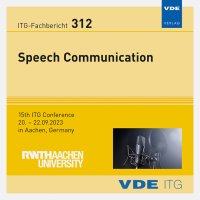On the Behavior of Intrusive and Non-intrusive Speech Enhancement Metrics in Predictive and Generative Settings
Konferenz: Speech Communication - 15th ITG Conference
20.09.2023-22.09.2023 in Aachen
doi:10.30420/456164051
Tagungsband: ITG-Fb. 312: Speech Communication
Seiten: 5Sprache: EnglischTyp: PDF
Autoren:
de Oliveira, Danilo; Richter, Julius; Lemercier, Jean-Marie; Peer, Tal; Gerkmann, Timo (Universität Hamburg, Germany)
Inhalt:
Since its inception, the field of deep speech enhancement has been dominated by predictive (discriminative) approaches, such as spectral mapping or masking. Recently, however, novel generative approaches have been applied to speech enhancement, attaining good denoising performance with high subjective quality scores. At the same time, advances in deep learning also allowed for the creation of neural network-based metrics, which have desirable traits such as being able to work without a reference (non-intrusively). Since generatively enhanced speech tends to exhibit radically different residual distortions, its evaluation using instrumental speech metrics may behave differently compared to predictively enhanced speech. In this paper, we evaluate the performance of the same speech enhancement backbone trained under predictive and generative paradigms on a variety of metrics and show that intrusive and non-intrusive measures correlate differently for each paradigm. This analysis motivates the search for metrics that can together paint a complete and unbiased picture of speech enhancement performance, irrespective of the model’s training process.


